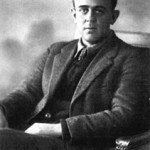Lived: 1887-1920
Nationality: American
Profession: Journalist, socialist activist
Books: Ten Days that Shook the World
Perspective: Socialist
Synopsis
John Reed’s popular Russian Revolution book, Ten Days that Shook the World, is more commentary than history: it was written from the perspective of someone experiencing the revolution first-hand. An American journalist of socialist persuasion, Reed travelled to Russia in the summer of 1917, when the Provisional Government was in its last throes and a Bolshevik uprising was imminent. Given his political leanings, it is hardly surprising that Reed’s account is sympathetic to the Bolsheviks and their cause. He portrays their leaders – particularly Lenin, Trotsky and Zinoviev – in a favourable light and suggests they enjoyed extensive support among ordinary Russians. When Reed’s book was published in 1919 it contained a foreword from Lenin himself, who commended it to “the workers of the world”. Stalin later banned Reed’s text, probably because it only mentioned him once yet heaped praise on Trotsky. Reed was still in Russia when he died of typhus in 1920. He was subsequently buried inside the walls of the Kremlin, the only American to receive this honour. Reds, an Oscar-winning film depicting Reed’s life and adventures in Russia, was made in 1981.
Quotations
“The Russian workman is revolutionary, but he is neither violent, dogmatic, nor unintelligent. He is ready and willing to fight his oppressor, the capitalist class, to a finish. But he does not ignore the existence of other classes. He merely asks that the other classes take one side or the other.”
“The propertied classes wanted merely a political revolution, which would take the power from the Tsar and give it to them. They wanted Russia to be a constitutional Republic, like France or the United States; or a constitutional Monarchy, like England. On the other hand, the masses of the people wanted real industrial and agrarian democracy.”
“Russia was in a state of solution. As long ago as 1905 the process begun; the March Revolution had hastened it … but perpetuated the hollow structure of the old regime. Now, however, the Bolsheviki, in one night, had dissipated it, as one blows away smoke. Old Russia was no more.”
“Instead of being a destructive force, it seems to me that the Bolsheviki were the only party in Russia with a constructive program and the power to impose it on the country.”
“For the first few months of the new [Bolshevik] regime, in spite of the confusion … when one hundred and sixty millions of the world’s most oppressed peoples suddenly achieved liberty, both the internal situation and the combative power of the army actually improved.”
“In the struggle, my sympathies were not neutral. But in telling the story of those great days I have tried to see events with the eye of a conscientious reporter, interested in setting down the truth.”

